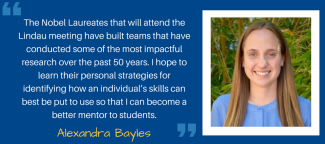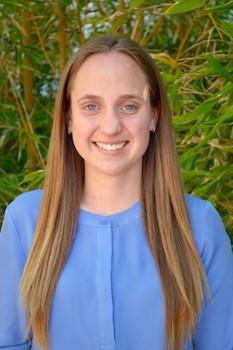Top Stories
This year, Alexandra Bayles – a graduate student in Chemical Engineering – was selected by UCSB and an international committee to attend the June 25-30 Lindau Nobel Laureate Meetings to network with Nobel Laureates and the next generation of difference makers.

 What happens when you gather 30 to 40 Nobel Laureates in a room with over 400 graduate students and postdoctoral scholars? Apparently, a whole lot of interdisciplinary exchange to inspire a new generation of scientists.
What happens when you gather 30 to 40 Nobel Laureates in a room with over 400 graduate students and postdoctoral scholars? Apparently, a whole lot of interdisciplinary exchange to inspire a new generation of scientists.
This year, Alexandra Bayles - a graduate student in Chemical Engineering - was selected by UCSB and an international committee to attend the June 25-30 Lindau Nobel Laureate Meetings âto network with Nobel Laureates and âthe next generation of difference makers.
Alexandra took some time to chat with us about her plans for the Lindau meeting, her research, and how this meeting âmight influence her career as a future professor.
What are you hoping to take away from this meeting?
I am eager to hear the opinions of the Nobel Laureates and young researchers regarding what are the most important, unsolved questions in modern chemistry. I want to know what excites them most at this moment, what drives them to work in the morning.
What are your own personal goals for this meeting?
During periods of informal discussion, I hope to discuss the personal research experiences of the Nobel Laureates. I want to learn what decisions they made, intentionally or unintentionally, to position their careers in such a way that exposed them to the right blend of collaborators and tools to do highly impactful research.
Speaking of research, can you tell us what you are working on?
I'm studying multicomponent diffusion in ionic liquids (ILs), which are salts that are in a liquid state below 100 °C. These liquids possess unique physicochemical properties that make them potentially useful in a broad range of applications, including separation processes, homogeneous catalysis, and electrochemical devices. Developing a better mechanistic understanding of how ions and molecules move in ILs will enable rational design of ILs for different applications.
How do you âhope to apply what you learn at âLindau to your career?
Ultimately, my goal is to become a professor of Chemical Engineering. I hope to lead a research group that is at the forefront of developing complex fluids that meet sustainability and energy challenges, and novel methods for characterizing them. The Nobel Laureates that will attend the Lindau meeting have built teams that have conducted some of the most impactful research over the past 50 years. I hope to learn their personal strategies for identifying how an individual's skills can best be put to use so that I can become a better mentor to students.